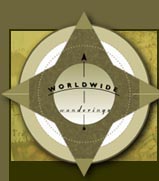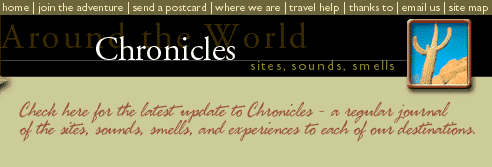|
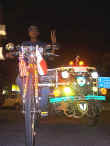 June 30 - July 4,
1999 Melaka, Malaysia June 30 - July 4,
1999 Melaka, Malaysia"What does this one
do?" I ask, pointing to one of a half dozen toggle switches lined up along his
makeshift handlebar console.
"Flashing lights by wheel, in front."
"And this one?"
"These small ones, here" he explains as he points to a plate, also
mounted to the front of the handlebars, that's about the size of an envelope and loaded
with 30-40 tiny diodes. "And this one for radio. This one for power meter." he
says proudly as he flips it on, showing me that the auto battery tucked away beneath our
seat is at full charge.
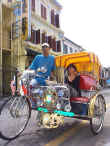 Amee's voice shudders a bit during his
explanations. As he peddles, the three of us bounce along the sometimes rocky
cobblestone (but more often times just plain ol' bumpy asphalt) streets of time-honored
Melaka. We're crusin' in the most classic of rides - a pedal-powered trishaw. Basically a
standard bicycle, but with a carriage of a small bench seat for two, a canopy, and a third
wheel (thus the name trishaw) bolted and welded to the frame, this small
pollution-free mode of transport is ideal for the old, narrow streets of Melaka. Although
it's pedal powered, it still has all the amenities of a modern motor bike - a jammin'
stereo with 6" woofers, a shrill electric horn, three or four metal 'ching, ching'
bells, functional brake lights, a not so functional head light, dancing diodes, yards and
yards of blinking lights, and a console (complete with battery charge meter) that controls
it all. "Battery last 3 days, then swap with charged one." Amee informs us. Amee's voice shudders a bit during his
explanations. As he peddles, the three of us bounce along the sometimes rocky
cobblestone (but more often times just plain ol' bumpy asphalt) streets of time-honored
Melaka. We're crusin' in the most classic of rides - a pedal-powered trishaw. Basically a
standard bicycle, but with a carriage of a small bench seat for two, a canopy, and a third
wheel (thus the name trishaw) bolted and welded to the frame, this small
pollution-free mode of transport is ideal for the old, narrow streets of Melaka. Although
it's pedal powered, it still has all the amenities of a modern motor bike - a jammin'
stereo with 6" woofers, a shrill electric horn, three or four metal 'ching, ching'
bells, functional brake lights, a not so functional head light, dancing diodes, yards and
yards of blinking lights, and a console (complete with battery charge meter) that controls
it all. "Battery last 3 days, then swap with charged one." Amee informs us.
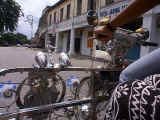 And here we are, happily bumping along in the hot Melaka
sun, flags fluttering in the breeze, and stereo blaring an upbeat little disco ditty
straight from the U.S. (dance all day . . my Romeo, oh Romeo . . a cowboy guy from head to
toe . . he's so fine, now get in line, a five six seven eight . . bomp, bomp, bomp). All
while getting a mini-tour of Malacca, arguably Malaysia's most historical city. What's now
a mish-mash of cultures and influences (Chinese, Siamese, Portuguese, Dutch, English, and
Indian) is sadly the direct product of years of struggle and strife, as the port was often
invaded, sometimes even traded, among the military powerhouses of both Asia and Europe. And here we are, happily bumping along in the hot Melaka
sun, flags fluttering in the breeze, and stereo blaring an upbeat little disco ditty
straight from the U.S. (dance all day . . my Romeo, oh Romeo . . a cowboy guy from head to
toe . . he's so fine, now get in line, a five six seven eight . . bomp, bomp, bomp). All
while getting a mini-tour of Malacca, arguably Malaysia's most historical city. What's now
a mish-mash of cultures and influences (Chinese, Siamese, Portuguese, Dutch, English, and
Indian) is sadly the direct product of years of struggle and strife, as the port was often
invaded, sometimes even traded, among the military powerhouses of both Asia and Europe.
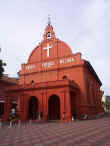 But on the bright side, the resulting hodge-podge mix of people,
cultures and religions, make Melaka, and for that matter the entire country of Malaysia,
not only one of the most diverse and interesting, but also one of the easiest 'traveling
countries' in Southeast Asia. It's a combination of things, really. Intangibles such as
the country's relative wealth; very reasonable prices; the wide-spread use of at least
rudimentary English (mostly self taught from one of the U.S.A.'s 'wonderful' exports, TV
shows like Rikki Lake or Cosby); a stable government; and water that you can
drink straight from the tap. But what really makes for easy traveling is Malaysia's
outwardly friendly people, who always return (and sometimes even initiate) a smile, nod,
or wave to a passerby. But on the bright side, the resulting hodge-podge mix of people,
cultures and religions, make Melaka, and for that matter the entire country of Malaysia,
not only one of the most diverse and interesting, but also one of the easiest 'traveling
countries' in Southeast Asia. It's a combination of things, really. Intangibles such as
the country's relative wealth; very reasonable prices; the wide-spread use of at least
rudimentary English (mostly self taught from one of the U.S.A.'s 'wonderful' exports, TV
shows like Rikki Lake or Cosby); a stable government; and water that you can
drink straight from the tap. But what really makes for easy traveling is Malaysia's
outwardly friendly people, who always return (and sometimes even initiate) a smile, nod,
or wave to a passerby.
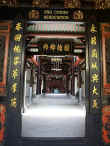 "O.K., now this, this Old Chinatown" Amee
tells us as we swing around the corner, we notice an almost immediate change in the
surrounding atmosphere. "You ever wonder why it is that a city's Chinatown is almost
always its most entertaining and colorful area?" I lean over and ask Laura. "And
do you think that there's such a thing as a 'Chinatown' in China?" "O.K., now this, this Old Chinatown" Amee
tells us as we swing around the corner, we notice an almost immediate change in the
surrounding atmosphere. "You ever wonder why it is that a city's Chinatown is almost
always its most entertaining and colorful area?" I lean over and ask Laura. "And
do you think that there's such a thing as a 'Chinatown' in China?"
"What? You're loony! Where do you come up with stuff like that?" she replies as
we pull up to our first stop, a bound feet shoe maker.
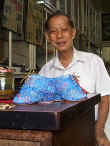 Yep,
a bound feet shoe maker. The practice is rare nowadays, but at one time the Chinese
thought that small feet on women were a sign of beauty, prestige and wealth. The small
girls from the wealthier families would literally pay the price or their family's success
by having their feet basically folded over in half, and then tightly bound with cloth,
causing them to grow into permanent disfigurement. Today, thankfully the practice has been
outlawed. But the few women from that era who are still alive, survive a daily hell of
pain and immobility, and still need shoes. It's this service that our friend the cobbler
still proudly provides. Yep,
a bound feet shoe maker. The practice is rare nowadays, but at one time the Chinese
thought that small feet on women were a sign of beauty, prestige and wealth. The small
girls from the wealthier families would literally pay the price or their family's success
by having their feet basically folded over in half, and then tightly bound with cloth,
causing them to grow into permanent disfigurement. Today, thankfully the practice has been
outlawed. But the few women from that era who are still alive, survive a daily hell of
pain and immobility, and still need shoes. It's this service that our friend the cobbler
still proudly provides.
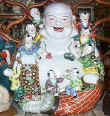 Our
next few stops include a temple or two, a mausoleum, and a handful of shops along the
famous antiques and collectibles avenue, Jonket Street. Our browsing turns up a number of
good finds, but also uncovers loads of overpriced trinkets, all proving the road remains
true to its name of jonket or 'junk' street. Laura and I decide to continue our tour by
water. With a quick goodbye to Amee, we hop on a converted tug/fishing vessel for a trip
up through the center of Melaka via its river. Well, they call it a river, and I guess, as
filthy and dirty as it is, technically it's still a river. Our
next few stops include a temple or two, a mausoleum, and a handful of shops along the
famous antiques and collectibles avenue, Jonket Street. Our browsing turns up a number of
good finds, but also uncovers loads of overpriced trinkets, all proving the road remains
true to its name of jonket or 'junk' street. Laura and I decide to continue our tour by
water. With a quick goodbye to Amee, we hop on a converted tug/fishing vessel for a trip
up through the center of Melaka via its river. Well, they call it a river, and I guess, as
filthy and dirty as it is, technically it's still a river.
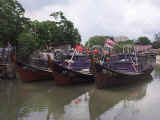 The river's floating refuse shares the
murky brown water with a hearty, if not somewhat strange, spectrum of wildlife.
Wildlife such as giant rodent-eating lizards, raucous and noisy black crows, tough and
scrappy free-range chicken, mound-making mud lobsters, and amphibious fish that can both
breath air and walk on land. Its banks are lined with now anchored fishing junkets, wooden
shanties balancing precariously on stilts, and centuries old brick and mortar riverside
tradehouses that look as though they're ready to crumble and avalanche into the river at
any moment. The river's floating refuse shares the
murky brown water with a hearty, if not somewhat strange, spectrum of wildlife.
Wildlife such as giant rodent-eating lizards, raucous and noisy black crows, tough and
scrappy free-range chicken, mound-making mud lobsters, and amphibious fish that can both
breath air and walk on land. Its banks are lined with now anchored fishing junkets, wooden
shanties balancing precariously on stilts, and centuries old brick and mortar riverside
tradehouses that look as though they're ready to crumble and avalanche into the river at
any moment.
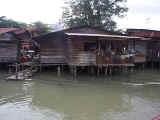 Stretching out between the shanties and junkets, are the
'flags of the United Nations' (colorful lines of laundry waving in the breeze), and
'walkways to the sea' (rickety docks and piers jutting randomly from the shore). But I
have to admit that taken all together, these disparate parts paint quite a picture and
create quite a scene. A scene so eccentric in fact, that it even impressed the tainted
Hollywood types enough to use it for a setting for their new big screen blockbuster, Entrapment
with Sean Connery. Pretty impressive stuff for a bunch of ol' lizards, fishermen, and
amphibious fish just doing what they can to get by. Stretching out between the shanties and junkets, are the
'flags of the United Nations' (colorful lines of laundry waving in the breeze), and
'walkways to the sea' (rickety docks and piers jutting randomly from the shore). But I
have to admit that taken all together, these disparate parts paint quite a picture and
create quite a scene. A scene so eccentric in fact, that it even impressed the tainted
Hollywood types enough to use it for a setting for their new big screen blockbuster, Entrapment
with Sean Connery. Pretty impressive stuff for a bunch of ol' lizards, fishermen, and
amphibious fish just doing what they can to get by.
|
